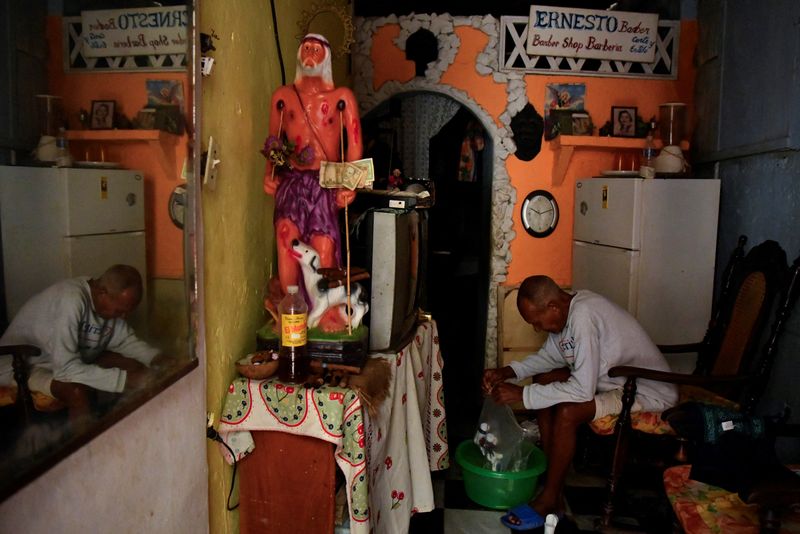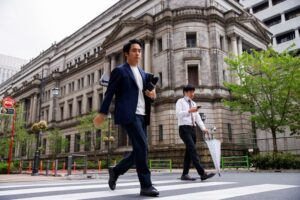Cuba restores power to one-fifth of population after nationwide blackouts

By Dave Sherwood
HAVANA (Reuters) -Cuba’s government said late on Saturday it had restored power to nearly one-fifth of the island’s people after the national grid collapsed twice in 24 hours, plunging millions of people into darkness.
The unprecedented nationwide blackout is the latest blow in the nation of 10 million, already suffering from dramatic shortages of food, medicine and fuel.
Cuba’s top electricity official, Lazaro Guerra, said the grid operator was working to restore electricity but that the process would be slow and rushing the job could lead to more blackouts and a deterioration of service.
“I cannot assure you that we will be able to complete linking the system today, but we are estimating that there should be important progress today,” Guerra said on a TV newscast earlier in the day.
The capital Havana was still largely in the dark on Saturday evening. Strong winds and rain began to buffet much of the Caribbean island ahead of the arrival of Hurricane Oscar, which was expected to graze northeastern Cuba in the coming days.
The hurricane caps a dramatic series of events in Cuba over several days that has raised tensions among the island’s already exhausted residents.
Cuba’s electrical grid first failed around midday on Friday after one of the island’s largest power plants shut down. The grid collapsed again on Saturday morning, state-run media reported.
Even before the two grid failures, a dire electricity shortfall on Friday had forced Cuba’s Communist-run government to send non-essential state workers home and cancel school for children as it sought to conserve fuel for power generation.
The government has blamed weeks of worsening blackouts – as long as 10 to 20 hours a day across much of the island – on deteriorating infrastructure, fuel shortages and rising demand.
Strong winds that began with Hurricane Milton last week had also complicated Cuba’s ability to deliver scarce fuel from boats offshore to feed its power plants, officials have said.
Cuba also blames the U.S. trade embargo, as well as sanctions instituted by then-President Donald Trump, for ongoing difficulties in acquiring fuel and spare parts to operate and maintain its oil-fired plants.
“There are those who sing victory and join the ambition of seeing Cuba on its knees with the interruption of the electrical system,” said Vice Foreign Minister Carlos Fernandez de Cossio on X on Saturday.
“They support the ruthless U.S. aggression,” he posted. “We respond with the talent and commitment of our (grid) workers and executives.”
FUEL WOES
The United States on Friday denied any role in Cuba’s grid collapse.
“As we have seen over the past few years, Cuba’s economic conditions, stemming from long-term mismanagement of its economic policy and resources, have increased hardships on the Cuban people,” a State Department official said.
“The United States obviously is not to blame for today’s blackout on the island, or the overall energy situation in Cuba.”
Cuban officials have said even if the immediate grid collapse is resolved, the electricity crisis will continue.
Cuba produces little of its own , and fuel deliveries to the island have dropped significantly this year, as Venezuela, Russia and Mexico, once important suppliers, have reduced their exports to Cuba.
Ally Venezuela slashed by half its deliveries of subsidized fuel to Cuba this year, forcing the island to search for more costly oil on the spot market.
Some Cubans, accustomed to hardship, said they were coping.
Rene Duarte, 60, strolled through Old Havana on a rainy Saturday morning to get fresh air, he said, after a night of little sleep, a result of the muggy weather.
“We’re used to taking everything in stride, because we have no other choice,” he said.

Later on Saturday, Havana remained largely quiet. Reuters observed a small group of people banging pots and blockading a road in Marianao on the outskirts of the capital. The protesters scattered when police arrived.
Following Hurricane Ian in September 2022, Cuba’s grid collapsed, leaving the entire country without power for several days. Authorities eventually re-established service, but not before protests broke out in various cities, including Havana.





